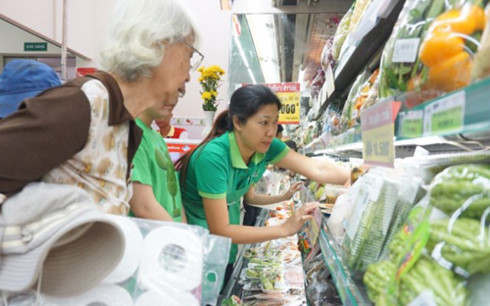The rising number of single-person households in conjunction with rising incomes in the larger metropolitan areas of Vietnam is helping to fuel a boom in neighbourhood convenience stores.

This, said Le Viet Nga of the Ministry of Industry and Trade, is one of the few bright spots in the sluggish domestic sector of the economy at a recent economic forum in the capital city of Hanoi.
Ms Nga, who heads up the Domestic Market Department of the Ministry, said most convenience stores are franchises, which offer tremendous benefits for local entrepreneurs to operate a business.
The number of convenience stores and minimarts, she said, has jumped by double digit figures over the past five years, to an estimated 1,800 this year, according to official Ministry statistics.
Ms Nga said analysts point to the rising number of single-person households and higher family incomes in the larger metropolitan areas such as Hanoi, Danang and Ho Chi Minh City as the main driving force for the changing consumer preferences.
The transition of primarily younger generations away from the smaller country villages to urban areas to take manufacturing jobs is projected to continue for the foreseeable future, she noted.
As is, the upward path of disposable incomes as Vietnamese society transitions away from primarily a rural agricultural to a more modern urbanized manufacturing society continues.
She also pointed out some dubious statistics that purportedly show that in China there is one convenience store for every 21,000 people, while the figure is 1,800 in the Republic of Korea and 69,000 in Vietnam.
Somehow, she rationalizes that means there is immense potential for the convenience store segment to grow.
But other experts disagree saying that logic is a little like comparing apples to oranges— and argue the segment in cities like HCM City is nearing saturation, lacks earnings potential and a major shakeout is already in the works.
Market saturation
We cannot continue to put our money into a saturated and unprofitable convenience store market such as Vietnam, said Koji Takayanagi, president of FamilyMart, the second largest convenience store chain in Japan.
FamilyMart first started establishing stores in Vietnam in 2010 and had at one time the opening of 300 stores on its development schedule, which it planned to operate in collaboration with local distributor Phu Thai Group.
But that deal fell through the cracks in 2013, with Phu Thai Group taking over 42 FamilyMart stores and turning them into Bs Mart in collaboration with Thailand Beri Jucker Plc.
FamilyMart made a comeback in July 2013 and now operates 130 stores in Ho Chi Minh City, the nearby resort town of Vung Tau and in Binh Duong Province, and had expected to expand to 150 by year’s end.
FamilyMart had forecasted operating earnings to grow by more than twofold to US$8.8 billion in 2016, said Mr Takayanagi. But that did not pan out for FamilyMart as earnings paled in contrast to more lucrative ventures in China and Taiwan.
If we can’t right the ship and get on a course to higher profits in 2017, we will not continue to do business in the Vietnam market, Mr Takayanagi was quoted as saying by multiple news outlets.
VOV